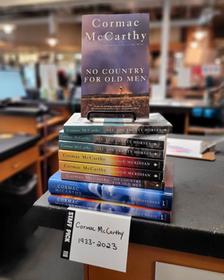.jpg)
|
|
| Cormac McCarthy (photo: Beowulf Sheehan) |
|
Cormac McCarthy, "the formidable and reclusive writer of Appalachia and the American Southwest, whose raggedly ornate early novels about misfits and grotesques gave way to the lush taciturnity of All the Pretty Horses and the apocalyptic minimalism of The Road," died June 13, the New York Times reported. He was 89. His death was confirmed via a statement from his publisher, Knopf.
"Cormac McCarthy changed the course of literature," said Nihar Malaviya, CEO of Penguin Random House. "For 60 years, he demonstrated an unwavering dedication to his craft, and to exploring the infinite possibilities and power of the written word. Millions of readers around the world embraced his characters, his mythic themes, and the intimate emotional truths he laid bare on every page, in brilliant novels that will remain both timely and timeless, for generations to come."
McCarthy's characters "were outsiders, like him. He lived quietly and determinately outside the literary mainstream," the Times wrote. "While not quite as reclusive as Thomas Pynchon, Mr. McCarthy gave no readings and no blurbs for the jackets of other writers' books. He never committed journalism or taught writing. He granted only a handful of interviews."
His first four novels--The Orchard Keeper (1965), Outer Dark (1968), Child of God (1973), and Suttree (1979)--"are bleak fables, set in the Appalachian South, related in tangled prose that owes an acknowledged debt to William Faulkner. Indeed, the editor of Mr. McCarthy's first five books, Albert Erskine of Random House, had been Faulkner's last editor," the Times noted. After Erskine's retirement, McCarthy moved from Random House to Knopf and acquired a new editor, Gary Fisketjon, who also worked with Raymond Carver, Richard Ford and Tobias Wolff, among others.
Critic Harold Bloom named McCarthy one of the four major American novelists of his time, alongside Philip Roth, Don DeLillo, and Thomas Pynchon, and called Blood Meridian (1985) "the greatest single book since Faulkner's As I Lay Dying."
A mainstream readership found McCarthy with his 1992 National Book Award-winning novel All the Pretty Horses, the first volume of his Border Trilogy--with The Crossing (1994) and Cities of the Plain (1998), all set in the Southwest. His post-apocalyptic novel The Road won a Pulitzer Prize in 2007. Both were adapted into films, as was No Country for Old Men, which won the Academy Award for best picture in 2008. In recent years, McCarthy's name came up annually as a potential winner of the Nobel Prize in Literature.
He also wrote occasionally for film and television, the Washington Post noted. One of his unsold screenplays inspired the Border Trilogy. Another evolved into his novel No Country for Old Men. He wrote the screenplay for the Ridley Scott film The Counselor (2013), as well as two plays, The Stonemason (first performed in 1995) and The Sunset Limited (2006), which he adapted into an HBO movie.
By the early 2000s, McCarthy was spending much of his time at the Santa Fe Institute, "where he served as a kind of artist-in-residence, chatting with researchers and helping edit their work for publication," the Post wrote. His scientific interests influenced his last two books, The Passenger and Stella Maris, intertwined novels published within weeks of each other in 2022. Both works drew praise from critics for the way McCarthy traded "his usual mythic characters for more ordinary-seeming people, including what for him was a rare female protagonist."
 |
|
| At Third Place Books, Seattle | |
"McCarthy was, if not our greatest novelist, certainly our greatest stylist," J.T. Barbarese, a professor of English and writing at Rutgers University, told NPR: "The obsession not only with the origins of evil, but also history. And those two themes intersect again and again and again in McCarthy's writing."
Many tributes to McCarthy have been appearing on social media since his death, including tweets by authors Stephen King ("Cormac McCarthy, maybe the greatest American novelist of my time, has passed away at 89. He was full of years and created a fine body of work, but I still mourn his passing.") and Robert Macfarlane ("Ah... Cormac McCarthy has died today. A giant of a writer, who wrote with a pen of iron, torqued language into new forms & worked the rhythms of prose into wire-flashes of lightning & great rolls of thunder.").
Shakespeare and Company bookstore, Paris, France, tweeted: "Few writers pass into legend during their lifetimes. Cormac McCarthy did. A true great. RIP."

